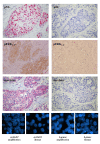Molecular alterations in key-regulator genes among patients with T4 breast carcinoma
- PMID: 20735841
- PMCID: PMC2936331
- DOI: 10.1186/1471-2407-10-458
Molecular alterations in key-regulator genes among patients with T4 breast carcinoma
Abstract
Background: Prognostic factors in patients who are diagnosed with T4 breast carcinomas are widely awaited. We here evaluated the clinical role of some molecular alterations involved in tumorigenesis in a well-characterized cohort of T4 breast cancer patients with a long follow-up period.
Methods: A consecutive series of 53 patients with T4 breast carcinoma was enrolled between 1992 and 2001 in Sardinia, and observed up for a median of 125 months. Archival paraffin-embedded tissue sections were used for immunohistochemistry (IHC) and fluorescence in situ hybridization (FISH) analyses, in order to assess alterations in expression levels of survivin, p53, and pERK1-2 proteins as well as in amplification of CyclinD1 and h-prune genes. The Kaplan-Meier and Cox regression methods were used for survival assessment and statistical analysis.
Results: Overall, patients carrying increased expression of pERK1-2 (p = 0.027) and survivin (p = 0.008) proteins as well as amplification of h-prune gene (p = 0.045) presented a statistically-significant poorer overall survival in comparison with cases found negative for such alterations. After multivariate analysis, the pathological response to primary chemotherapy and the survivin overexpression in primary carcinoma represented the main parameters with a role as independent prognostic factors in our series.
Conclusions: Although retrospective, our study identified some molecular parameters with a significant impact on prediction of the response to therapy or prognosis among T4 breast cancer patients. Further large prospective studies are needed in order to validate the use of such markers for the management of these patients.
Figures


Similar articles
-
Prognostic value of survivin expression in breast cancer patients: a meta-analysis.Tumour Biol. 2013 Aug;34(4):2053-62. doi: 10.1007/s13277-013-0848-2. Epub 2013 May 21. Tumour Biol. 2013. PMID: 23690235 Review.
-
Survivin antiapoptotic gene expression as a prognostic factor in non-small cell lung cancer: in situ hybridization study.Folia Histochem Cytobiol. 2005;43(4):237-42. Folia Histochem Cytobiol. 2005. PMID: 16382892
-
High survivin mRNA expression is a predictor of poor prognosis in breast cancer: a comparative study at the mRNA and protein level.Breast Cancer. 2014 Jul;21(4):482-90. doi: 10.1007/s12282-012-0403-9. Epub 2012 Sep 12. Breast Cancer. 2014. PMID: 22968628
-
Prognostic significance of cyclin D1, β-catenin, and MTA1 in patients with invasive ductal carcinoma of the breast.Ann Surg Oncol. 2012 Dec;19(13):4129-39. doi: 10.1245/s10434-012-2541-x. Epub 2012 Aug 3. Ann Surg Oncol. 2012. PMID: 22864797
-
Prognostic value of survivin expression in stage III non-small cell lung cancer patients treated with platinum-based therapy.Surg Oncol. 2015 Dec;24(4):329-34. doi: 10.1016/j.suronc.2015.09.001. Epub 2015 Sep 14. Surg Oncol. 2015. PMID: 26690822 Review.
Cited by
-
Neuroblastoma tumorigenesis is regulated through the Nm23-H1/h-Prune C-terminal interaction.Sci Rep. 2013;3:1351. doi: 10.1038/srep01351. Sci Rep. 2013. PMID: 23448979 Free PMC article.
-
Nestin expression associates with poor prognosis and triple negative phenotype in locally advanced (T4) breast cancer.Eur J Histochem. 2011 Nov 14;55(4):e39. doi: 10.4081/ejh.2011.e39. Eur J Histochem. 2011. PMID: 22297445 Free PMC article.
-
The prognostic role of survivin expression in breast cancer: A systematic review and meta-analysis.Medicine (Baltimore). 2024 Oct 4;103(40):e40013. doi: 10.1097/MD.0000000000040013. Medicine (Baltimore). 2024. PMID: 39465707 Free PMC article.
-
Regulation of the metastasis suppressor Nm23-H1 by tumor viruses.Naunyn Schmiedebergs Arch Pharmacol. 2015 Feb;388(2):207-24. doi: 10.1007/s00210-014-1043-8. Epub 2014 Sep 10. Naunyn Schmiedebergs Arch Pharmacol. 2015. PMID: 25199839 Free PMC article. Review.
-
Prognostic value of survivin expression in breast cancer patients: a meta-analysis.Tumour Biol. 2013 Aug;34(4):2053-62. doi: 10.1007/s13277-013-0848-2. Epub 2013 May 21. Tumour Biol. 2013. PMID: 23690235 Review.
References
-
- Sobin L, Wittekind C, (eds) TNM classification of malignant tumors. 6. John Wiley & Sons, New York; 2002.
-
- Singletary SE, Allred C, Ashley P, Bassett LW, Berry D, Bland KI, Borgen PI, Clark G, Edge SB, Hayes DF, Hughes LL, Hutter RV, Morrow M, Page DL, Recht A, Theriault RL, Thor A, Weaver DL, Wieand HS, Greene FL. Revision of the American Joint Committee on Cancer staging system for breast cancer. J Clin Oncol. 2002;20:3628–36. doi: 10.1200/JCO.2002.02.026. - DOI - PubMed
-
- Woodward WA, Strom EA, Tucker SL, McNeese MD, Perkins GH, Schechter NR, Singletary SE, Theriault RL, Hortobagyi GN, Hunt KK, Buchholz TA. Changes in the 2003 American Joint Committee on Cancer staging for breast cancer dramatically affect stage-specific survival. J Clin Oncol. 2003;21:3244–8. doi: 10.1200/JCO.2003.03.052. - DOI - PubMed
Publication types
MeSH terms
Substances
LinkOut - more resources
Full Text Sources
Medical
Research Materials
Miscellaneous

